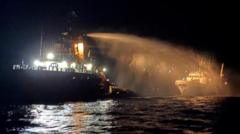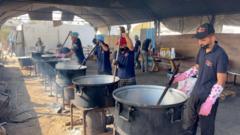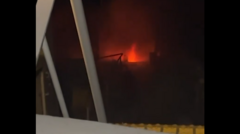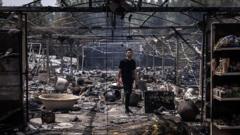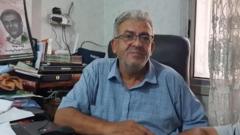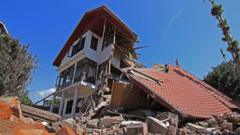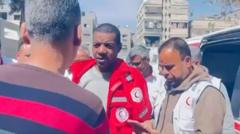Amid escalating violence and military actions in the occupied West Bank, particularly in Jenin, residents like Jumaa Zawayda face despair as their homes are reportedly destroyed, leaving thousands displaced and uncertain of their futures. International agencies raise alarms about unprecedented levels of destruction and displacement, as Israel intensifies its efforts against armed groups in the region.
"Displacement and Destruction: The Human Cost of Israeli Actions in Jenin Refugee Camp"
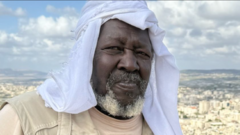
"Displacement and Destruction: The Human Cost of Israeli Actions in Jenin Refugee Camp"
The ongoing Israeli military operations in West Bank refugee camps lead to widespread demolitions and significant humanitarian crises for Palestinian residents.
As Israeli forces intensified their operations in the Jenin refugee camp, 66-year-old Jumaa Zawayda made a defiant stand. With his family evacuating, he opted to remain behind, fearing for the safety of his home amidst the chaos. Over three harrowing days, he endured a barrage of gunfire, thunderous explosions, and drone activity, all while enduring the psychological strain of an uncertain fate. Cut off from water and electricity, Jumaa ultimately abandoned his home to seek shelter elsewhere.
Months later, from a vantage point overlooking Jenin's devastated landscape, he grapples with the absence of clarity regarding the fate of his dwelling. Rumors of destruction circulate, but the Israeli military has imposed significant restrictions, limiting access and communication in the area. As he reflects on his family's plight, Jumaa, who has endured the dilemmas of displacement before, retained only his dog and a UN refugee identification card from his home.
As hostilities flare in Gaza, Israeli assaults targeting alleged militant positions in the West Bank have ramped up, particularly in areas where armed groups, including affiliates of Hamas and Palestinian Islamic Jihad, are active. Estimates suggest around 150 fighters operated within Jenin prior to recent military actions. The Palestinian Authority, embroiled in its own confrontations with these groups, has also faced accusations of contributing to the unrest.
Israel's defense minister labeled the refugee camps as "nests of terror," legitimizing increased military intervention. This culminated in a pronounced focus on demolishing buildings occupied by suspected militants, creating an acute humanitarian crisis. According to the UN's Palestinian refugee agency, Unrwa, at least 260 buildings containing approximately 800 apartments have been completely razed since the commencement of "Operation Iron Wall." This has left around 42,000 Palestinians displaced, with aid agencies deeming the situation tragic and extraordinary.
In a recent cooperation with humanitarian efforts, Jumaa was granted a fleeting chance to reclaim essentials from his former residence. He learned that his home was among the list of structures marked for demolition, alongside other infrastructures. The Israeli military contends such demolitions are essential for operational maneuvers against militant factions, while the implications on civilian life remain dire and largely unexplored.
Jumaa’s lingering questions illustrate the overarching tragedy: “Why was my house demolished? I ask for justification.” A tradesman for 50 years, Jumaa is determined to return to the land that bears the weight of his dreams. He reasons, “If I cannot rebuild my house, I’ll set up a tent in its place.” His resilience highlights the ongoing struggle for identity, belonging, and a place to call home amidst a crisis where forced displacement is commonplace.


